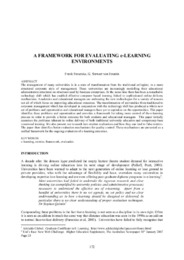A framework for evaluating e-learning Environments
Abstract
The management of many universities is in a state of transformation from the traditional collegiate, to a more
structured corporate style of management. These universities are increasingly modelling their educational
administration structures on structures used by business enterprises. At the same time there has been a remarkable
technology shift which has enabled effective computer based learning linked to sophisticated online delivery
mechanisms. Academics and educational managers are embracing the new technologies for a variety of reasons
not all of which focus on improving educational outcomes. The transformation of universities from traditional to
corporate management which has developed in conjunction with the technology shift has produced a whole new
set of problems and opportunities and educational managers have yet to capitalize on the opportunities. This paper
identifies these problems and opportunities and provides a framework for taking more control of the e-learning
process in order to provide a better outcome for both students and educational managers. This paper initially
examines the problems inherent in online delivery of both traditional university education and competency-base
vocational training. We also present our research into student evaluations and how they can lead to false metrics.
The paper then identifies better evaluation mechanisms for quality control. These mechanisms are presented as a
unified framework for the ongoing evaluation of e-learning outcomes.
